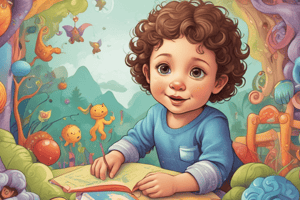Podcast
Questions and Answers
At what age does a child typically begin to develop a pincer grasp?
At what age does a child typically begin to develop a pincer grasp?
- 4-6 Months
- 1-3 Years
- 0-3 Months
- 7-12 Months (correct)
Which of the following is a gross motor skill milestone for children aged 1-3 years?
Which of the following is a gross motor skill milestone for children aged 1-3 years?
- Sits with support
- Lifts head while lying on stomach
- Begins to run (correct)
- Rolls over
What social-emotional skill is commonly exhibited by children aged 4-6 months?
What social-emotional skill is commonly exhibited by children aged 4-6 months?
- Expresses a range of emotions
- Understands and labels emotions
- Engages in parallel play
- Shows fear of strangers (correct)
At what developmental stage do children start to demonstrate separation anxiety?
At what developmental stage do children start to demonstrate separation anxiety?
What cognitive skill is observed in children aged 1-3 years?
What cognitive skill is observed in children aged 1-3 years?
Which fine motor skill is expected of children aged 3-5 years?
Which fine motor skill is expected of children aged 3-5 years?
What major gross motor skill achievement is noted in children aged 7-12 months?
What major gross motor skill achievement is noted in children aged 7-12 months?
Which emotional development skill is typical for children aged 3-5 years?
Which emotional development skill is typical for children aged 3-5 years?
At what age do children begin to show interest in toys and games as a cognitive development skill?
At what age do children begin to show interest in toys and games as a cognitive development skill?
What cognitive milestone is achieved by children by the age of 7-12 months?
What cognitive milestone is achieved by children by the age of 7-12 months?
Study Notes
Pediatric Developmental Milestones
Fine Motor Skills
- 0-3 Months
- Grasp reflex present; hands mostly clenched.
- 4-6 Months
- Purposeful reaching and grasping.
- Transfers objects from hand to hand.
- 7-12 Months
- Pincer grasp develops (using thumb and index finger).
- Begins to pick up small objects.
- 1-3 Years
- Stacks two or more blocks.
- Scribbles spontaneously; begins to imitate writing.
- 3-5 Years
- Cuts with scissors; can copy basic shapes.
- Completes puzzles with a few pieces.
Gross Motor Skills
- 0-3 Months
- Lifts head while lying on stomach.
- 4-6 Months
- Rolls over (front to back, back to front).
- Sits with support.
- 7-12 Months
- Sits independently.
- Crawls or scoots on belly.
- Pulls up to stand.
- 1-3 Years
- Walks independently; begins to run.
- Climbs furniture or stairs with assistance.
- 3-5 Years
- Hops and jumps; can catch and throw a ball.
- Rides a tricycle or similar toy.
Social-emotional Growth
- 0-3 Months
- Responds to social stimuli; smiles in response.
- 4-6 Months
- Enjoys playing with others; may show fear of strangers.
- 7-12 Months
- Develops attachment to caregivers.
- Exhibits separation anxiety.
- 1-3 Years
- Engages in parallel play; begins to show independence.
- Expresses a range of emotions (joy, anger, frustration).
- 3-5 Years
- Takes turns and shares; cooperative play develops.
- Understands and labels emotions in themselves and others.
Cognitive Development
- 0-3 Months
- Follows moving objects with eyes; begins to recognize faces.
- 4-6 Months
- Explores objects by mouthing and shaking.
- Shows interest in toys and games.
- 7-12 Months
- Understands object permanence (objects exist even when out of sight).
- Begins to use simple problem-solving skills (e.g., pulling a blanket to reach a toy).
- 1-3 Years
- Engages in pretend play; imitates everyday actions.
- Begins to sort objects by shape and color.
- 3-5 Years
- Can count to 10; understands basic time concepts (morning vs. night).
- Asks "why" questions; engages in more complex problem-solving.
Language Development
- 0-3 Months
- Coos and makes gurgling sounds; responds to loud sounds.
- 4-6 Months
- Babbling begins; imitates sounds.
- Responds to name; recognizes common words like "no."
- 7-12 Months
- Says simple words (e.g., "mama," "dada").
- Understands simple commands (e.g., “come here”).
- 1-3 Years
- Vocabulary expands to 50-100 words by age 2.
- Combines two or more words (e.g., "more juice").
- 3-5 Years
- Vocabulary grows to 1,000+ words; tells simple stories.
- Uses complete sentences and understands basic grammar.
Fine Motor Skills
- 0-3 Months: Grasp reflex is active; infants usually keep hands clenched.
- 4-6 Months: Infants begin purposeful reaching and grasping; can transfer objects between hands.
- 7-12 Months: Development of pincer grasp using thumb and index finger for picking up small items.
- 1-3 Years: Ability to stack two or more blocks; spontaneous scribbling begins alongside imitation of writing.
- 3-5 Years: Can cut with scissors and replicate basic shapes; enjoys completing simple puzzles.
Gross Motor Skills
- 0-3 Months: Ability to lift head when lying on stomach.
- 4-6 Months: Can roll over in both directions and sit with assistance.
- 7-12 Months: Attains independence in sitting; starts crawling or scooting and can pull up to a standing position.
- 1-3 Years: Walks independently and may start running; climbs furniture or stairs with help.
- 3-5 Years: Hops and jumps effectively; can catch and throw a ball and ride a tricycle or similar toy.
Social-emotional Growth
- 0-3 Months: Infants respond to social interaction with smiles.
- 4-6 Months: Enjoyment in playing with others begins, showing potential fear of strangers.
- 7-12 Months: Development of attachment to caregivers; separation anxiety may be observed.
- 1-3 Years: Participation in parallel play increases; children start expressing a wider range of emotions such as joy and frustration.
- 3-5 Years: Emergence of cooperative play; children learn to take turns, share, and identify emotions in themselves and others.
Cognitive Development
- 0-3 Months: Ability to follow moving objects visually; early recognition of faces.
- 4-6 Months: Exploration of objects through mouthing and shaking; displays interest in various toys and games.
- 7-12 Months: Understanding of object permanence; introduction to basic problem-solving skills (e.g., reaching for a toy via a blanket).
- 1-3 Years: Engagement in pretend play and imitation of everyday actions; beginning to categorize objects based on shape and color.
- 3-5 Years: Counts to ten and grasps basic time concepts; starts to ask "why" questions and tackles more complex problem-solving tasks.
Language Development
- 0-3 Months: Production of cooing and gurgling sounds; response to loud noises.
- 4-6 Months: Initiation of babbling; infants begin to imitate sounds and recognize their names and common words like "no."
- 7-12 Months: First simple words emerge, such as "mama" and "dada"; understanding of simple commands develops.
- 1-3 Years: Vocabulary expands to 50-100 words by age two; children learn to combine words (e.g., "more juice").
- 3-5 Years: Vocabulary grows to over 1,000 words, ability to tell simple stories; mastery of complete sentences and basic grammar concepts.
Studying That Suits You
Use AI to generate personalized quizzes and flashcards to suit your learning preferences.
Description
Test your knowledge on fine and gross motor skills milestones for infants and young children. This quiz covers essential developmental stages from birth to age five, highlighting key abilities and skills at each age group. Assess your understanding of pediatric growth and developmental benchmarks.




